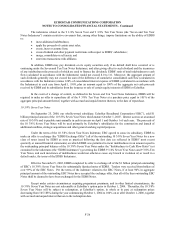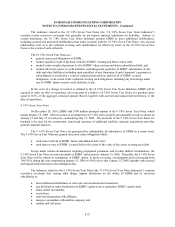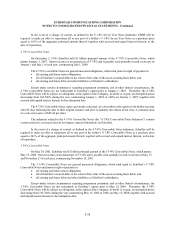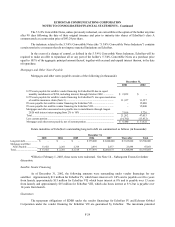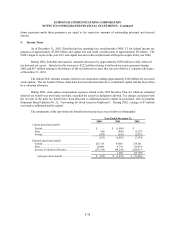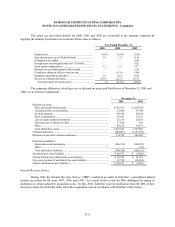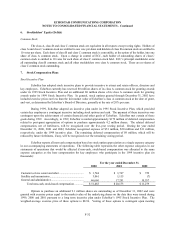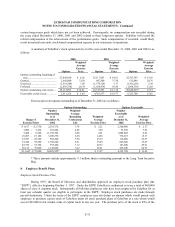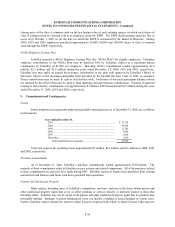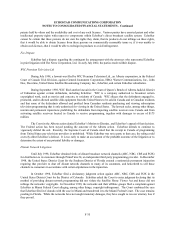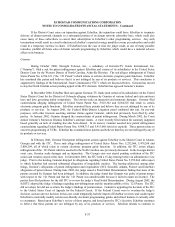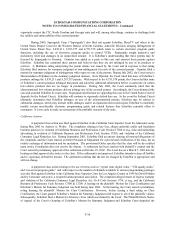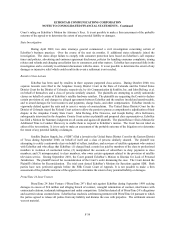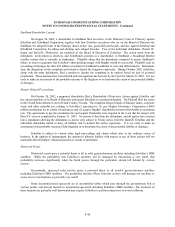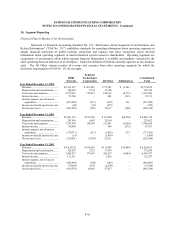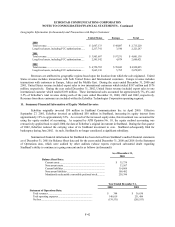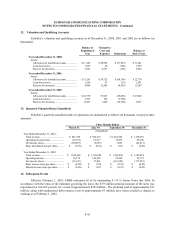Dish Network 2002 Annual Report Download - page 96
Download and view the complete annual report
Please find page 96 of the 2002 Dish Network annual report below. You can navigate through the pages in the report by either clicking on the pages listed below, or by using the keyword search tool below to find specific information within the annual report.ECHOSTAR COMMUNICATIONS CORPORATION
NOTES TO CONSOLIDATED FINANCIAL STATEMENTS - Continued
F-36
In February 1999, the networks filed a “Motion for Temporary Restraining Order, Preliminary Injunction and
Contempt Finding” against DirecTV, Inc. in Miami related to the delivery of distant network channels to DirecTV
customers by satellite. DirecTV settled that lawsuit with the networks. Under the terms of the settlement between
DirecTV and the networks, some DirecTV customers were scheduled to lose access to their satellite-provided distant
network channels by July 31, 1999, while other DirecTV customers were to be disconnected by December 31, 1999.
Subsequently, substantially all providers of satellite-delivered network programming other than EchoStar agreed to this
cut-off schedule, although EchoStar does not know if they adhered to this schedule.
In December 1998, the networks filed a Motion for Preliminary Injunction against Echostar in the Florida case
and asked the Court to enjoin EchoStar from providing network programming except under limited circumstances. A
preliminary injunction hearing was held in September 1999. In March 2000, the networks filed an emergency motion
again asking the Court to issue an injunction requiring EchoStar to cease providing network programming to certain of
its customers. At that time, the networks also argued that EchoStar’s compliance procedures violated the Satellite Home
Viewer Improvement Act, which was passed by Congress in November 1999. EchoStar opposed the networks’ motion
and again asked the Court to hear live testimony before ruling upon the networks’ injunction request.
During September 2000, the Court granted the networks’ motion for preliminary injunction, denied the
networks’ emergency motion, and denied EchoStar’s request to present live testimony and evidence. The Court’s
original order required EchoStar to terminate network programming to certain subscribers “no later than February 15,
1999,” and contained other dates with which it would be physically impossible to comply. The order imposed
restrictions on EchoStar’s past and future sale of distant ABC, NBC, CBS and FOX channels similar to those imposed
on PrimeTime 24 (and, EchoStar believes, on DirecTV and others). Some of those restrictions go beyond the statutory
requirements imposed by the Satellite Home Viewer Act and the Satellite Home Viewer Improvement Act.
Twice during October 2000, the Court amended its original preliminary injunction order in an effort to fix
some of the errors in the original order. The twice-amended preliminary injunction order required EchoStar to shut off,
by February 15, 2001, all subscribers who were ineligible to receive distant network programming under the Court’s
order. EchoStar appealed the preliminary injunction orders. During September 2001, the United States Court of
Appeals for the Eleventh Circuit vacated the District Court’s nationwide preliminary injunction, which the Eleventh
Circuit had stayed in November 2000. The Eleventh Circuit also rejected EchoStar’s First Amendment challenge to the
Satellite Home Viewer Act. However, the Eleventh Circuit found that the District Court had made factual findings that
were clearly erroneous and not supported by the evidence, and that the District Court had misinterpreted and misapplied
the law. The Eleventh Circuit issued an order during January 2002 remanding the case to the Florida District Court.
During March 2002, the Florida District Court entered an order setting the trial in the matter for January 13, 2003 and
setting a discovery and pretrial schedule. In this order, the District Court denied certain of EchoStar’s outstanding
motions to compel discovery as moot and granted the networks’ motion to compel. The trial date has now been moved
to April 7, 2003. During April 2002, the District Court denied the networks’ motion for preliminary injunction as moot.
In June 2002, EchoStar filed a counterclaim against the networks asking the District Court to find that EchoStar is not
violating the Satellite Home Viewer Act and seeking damages resulting from the networks’ tortious interference with
EchoStar’s business relationships and from the networks’ conduct amounting to unfair competition. The networks filed
a motion to dismiss these claims. In August 2002, the District Court denied the networks’ motion to dismiss. In
September 2002, the networks answered our counterclaim.
In April 2002, EchoStar reached a private settlement with ABC, Inc., one of the plaintiffs in the litigation
and jointly filed a stipulation of dismissal. On April 16, 2002, the District Court entered an order dismissing the
claims between ABC, Inc. and EchoStar. In November 2002, EchoStar reached a private settlement with NBC,
another of the plaintiffs in the litigation and jointly filed a stipulation of dismissal. On November 25, 2002, the
District court entered an order dismissing the claims between NBC and EchoStar. Six of the original eight plaintiffs
remain, including CBS and Fox, along with the associations affiliated with each of the four networks. On January
28, 2003, the parties participated in a court ordered mediation. The mediation did not resolve the parties' disputes.
However, the parties agreed to continue the mediation and participate in another mediation session.


